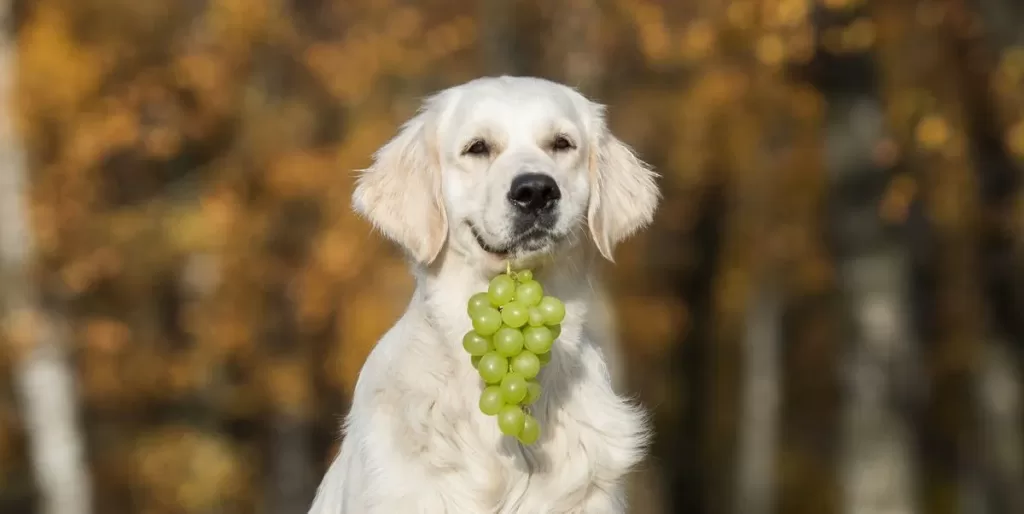My dog ate grapes: While it’s always a good idea to keep an eye on your pet, eating grapes doesn’t seem to pose any health risks for most dogs. If your dog does have any unusual symptoms after eating grapes, such as vomiting or diarrhea, please consult your veterinarian.
Why Are Grapes Toxic to Dogs?
Grapes of any kind, including green grapes, red grapes, purple grapes, seeded grapes, and seedless grapes, are harmful to dogs and should not be given to them.
In addition to that, grapes are used to make wine, grape juice, raisins, and currants. However, researchers aren’t sure why this is the case.
It has been hypothesized that tartaric acid, mycotoxin, which is a poisonous compound produced by mold or fungus, or a salicylate medication that is present in grapes may be responsible for dogs developing health issues.
What to Do If Your Dog Ate Grapes?
There is no one standard dose that can be considered hazardous for grapes. Instead, it differs from dog to dog due to the fact that every dog has their own unique sensitivity to various kinds of food.
Also Read: Can Dogs Eat Mango?
Bear in mind that the greater the number of grapes, raisins, or currants that your dog consumes, the higher the risk that he will become ill. Even if your dog has just consumed one grape, you should still consult with a veterinarian or call the pet poison helpline at (855) 764-7661 to find out what steps you should take next. They will almost certainly warn you to keep an eye out for the symptoms of grape poisoning.
Symptoms: The signs your dog is having trouble
If your dog has been eating grapes, it is important to monitor them closely for any signs of illness. Symptoms of grape poisoning in dogs can include vomiting, diarrhea, lethargy, and seizures.
It doesn’t matter if your senior or adult dog, adult puppy, or puppy just ate grapes, raisins, or currants; there are certain indicators that you should look out for to determine if it’s time to take him to the veterinarian. Grape and raisin toxicity can be indicated by the following symptoms:
- A decreased desire to eat
- At first, I was drinking quite a lot.
- Diarrhea
- Vomiting
- Abdominal discomfort
- Weakness
- Lethargy
- Having bad breath
Initial symptoms include an increase in the frequency and volume of urination, followed by a drop in urine output as the kidneys begin to shut down.
In most cases, the onset of symptoms occurs between 12 and 24 hours after eating grapes, raisins, or currants, or drinking grape juice. In rare cases, however, symptoms can appear much sooner.
If there is anything about your dog that seems out of the ordinary, you should contact your veterinarian as soon as possible. In the event that your veterinarian’s office is closed for the day, you will need to make sure that you transport your dog to an animal hospital that is open around the clock. Poisoning from grapes can cause damage to the kidneys, which can ultimately lead to acute renal failure and death.
If you notice any of these symptoms in your dog, contact a veterinarian as soon as possible.
Diagnosis: What tests or examinations need to be done?
As a dog owner, you may be concerned when your pet eats grapes. In most cases, your dog will be just fine. However, if your dog experiences any signs or symptoms that suggest he’s been harmed by grapes, you should contact a veterinarian.
Additionally, if you notice any changes in your pet’s behavior or health after eating grapes, it is important to consult with a vet as soon as possible.
Some of the key signs and symptoms of grape poisoning in dogs include increased thirst and urination; vomiting; diarrhea; lethargy; seizures; coma; and death.
If you suspect that your dog has ingested grape poison, take him to the veterinarian immediately for diagnosis and treatment.
How Your Vet Will Treat Grape Poisoning
Your dog’s veterinarian is going to work on restoring any kidney function that may have been lost as well as preventing other kidney problems from developing. They may attempt to induce vomiting in your dog and then give him activated charcoal in an effort to prevent the poisons from being absorbed by the dog’s intestines or stomach.
It’s possible that your veterinarian will recommend intravenous fluids or fluid therapy in order to protect your dog’s kidneys as well.
If you call your veterinarian, they may recommend that you treat your dog immediately at home by administering a solution of hydrogen peroxide measured out as 1 teaspoon for every 5 pounds of the animal’s body weight.
This will make you feel sick to your stomach. Dog owners shouldn’t make any decisions without first consulting with their veterinarian.
Conclusion: How you can make sure this doesn’t happen again
Grapes, raisins, grape juice, and currants should be stored in a secure location out of reach of dogs at all times by the owners of dogs and other domesticated animals, such as grapes, raisins, and grape juice are toxic to dogs.
Look over the list of ingredients before giving your dog any human food; you might be shocked to see grapes or grape juice in some of the things on the list.
In addition, in order to safeguard the well-being of your canine companion, you should instruct your children not to offer grapes that they have been given to your dog.
It might be best to hold off on offering grapes to young children until they have a better understanding of how harmful this fruit can be for dogs and puppies.
Because children have a habit of making a mess when they eat, a grape may roll off the table onto the floor, and before you can stop him, your dog may wind up eating it.

